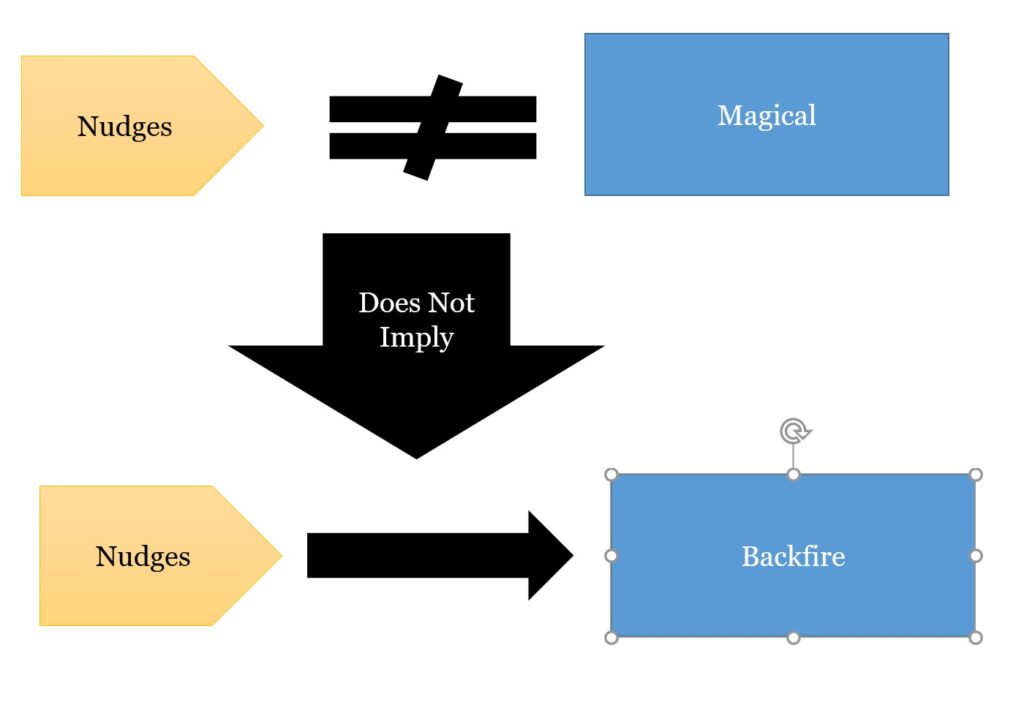The idea of nudging, designing choices to help people make better choices, has become popular for good reason. Yet, nudges aren’t magical, which some people seem disappointed about when they find this out.
Nudges Or What?
A nudge is a well-designed attempt to guide the decision-maker towards a beneficial outcome. The alternative seems to be random, bad, or counterproductive choice design. Governments want taxpayers to respond to letters telling them to send in their taxes on time. The options seem to be:
- 1) trying to develop an effective letter (a nudge), or
- 2) sending out whatever nonsense letter first comes to mind.
Of course, one can dispute the aims of a nudge. Perhaps you have an anti-tax philosophy. In which case you might not want people to pay their taxes at all. Still, if you send a letter surely you should send a good one?
Nudges Aren’t Magical
Nudging’s popularity has led to pushback. Utpal Dholakia (2016) tells us that nudges aren’t perfect. I’m not sure who thought they were. Still, sure, let’s accept that. Dholakia then goes on to document problems with “nudge psychology” (his term).
“Nudges can be condescending”. They can be. Yet, I don’t believe that thinking people “need help” is automatically bad. The world is really complex, I often need help to make good choices. It is a strange person, by which I mean a complete fool, who thinks they never need help.
Apparently, nudges may not achieve the end goal. Of course, this is also true. You might successfully nudge someone to invest for retirement and they still might blow all their savings at Vegas. So what? A nudge may help some people but not others. This is quite normal. It doesn’t imply the idea was a bad one.
An Alternative
Motivational approaches are then said to be harder but more effective. Even if this unsupported statement is true this is not evidence that nudging is bad. Nor is it evidence that nudges can backfire as the piece’s title suggests. At best this says you should use other tools as well. Who exactly disagrees with this?
Nudges are hard to get “just right”. Sure, that is why you test and refine them. At this point I wondered why nudges being hard is mentioned but any challenges with getting Dholakia’s favored motivation plans just right are completely ignored.
Another claim is that nudges’ effectiveness are “blunted” if people know about them. This is an empirical question. It is probably true at some times but not other times. Even if in all cases, some very well-informed people are immune to nudges doesn’t mean nudges don’t have a positive effect on the behavior of those who somehow forgot to read Richard Thaler’s book. Nor does lack of effect mean they backfire.

Nudges Plus More, Yes Please
If Dholakia’s thesis is that nudges aren’t magical he is surely correct. Because they aren’t magical they should be supplemented with other techniques, also seems like a valid point. The evidence of consistent “backfiring” is weak, however. My advice is to ignore the headline. There are bad advertisements that turn off customers, and there are bad nudges that are ineffective, or even counterproductive. If you find you have an ineffective nudge try a different one. Still, don’t give up on trying to help people make good decisions.
For more on public policy and behavioral economics see here.
Read: Utpal M. Dholaka, (2016) Why Nudging Your Customers Can Backfire, Harvard Business Review Online, https://hbr.org/2016/04/why-nudging-your-customers-can-backfire
